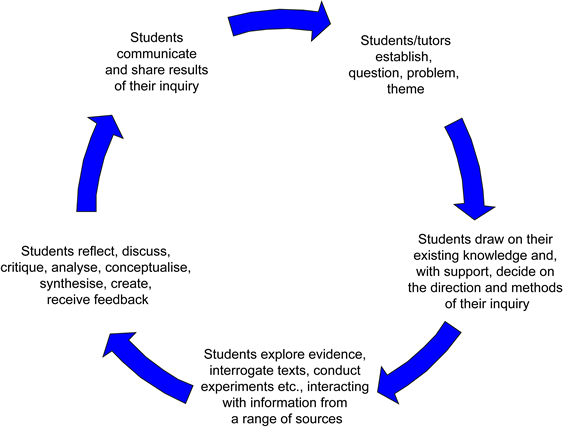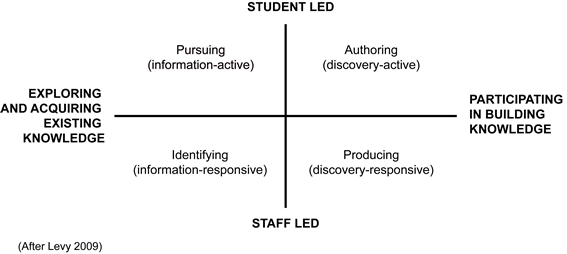Inquiry-based learning (IBL) [also known as Enquiry-based Learning – EBL], as developed by the Centre for Inquiry-based Learning in the Arts and Social Sciences CETL (CILASS), engages students in self-directed inquiry or research and makes the links between research and learning explicit. IBL includes case studies, problem-based learning (PBL) and research projects. IBL can be used for whole programmes/modules or as discrete activities built into a more traditional curriculum delivery – seminar, laboratory, fieldwork. IBL can be used when the outcome is that students have acquired specific discipline-based knowledge. Equally it can be used to engage students in the concept of contested knowledge. IBL is seen as a cycle (Fig 1).
Figure 1:The IBL cycle

(after Levy et al. 2011)
Benefits of IBL include:
- Improved experience of discipline-based learning
Development of transferrable skills for employability and lifelong learning such as:
- Autonomous learning
- Critical thinking
- Team-work
- Information literacy
- Student enthusiasm and motivation for learning
The CILASS identified two main conceptual axes through which students viewed their experiences:
- Information frame – staff-led through to student-led
- Discovery frame – exploring and acquiring existing knowledge in the discipline to participating in building knowledge in the discipline (Fig 2)
The resulting matrix is non-exclusive isince activities that students engage in may be confined to one quarter or may extend over two or more.
Figure 2: The IBL matrix

In each of the four ideal types the type and level of support will differ.
1. Identifying (information-responsive) Students explore the knowledge-base of the discipline in response to closed questions or lines of inquiry framed by staff ('what is the existing answer to this question?') Students respond to questions set by students through essays, for example
2. Pursuing (information-active) Students explore a knowledge-base by pursuing their own closed questions and lines of inquiry ('what is the existing answer to my question?') Students set their own questions and respond – essay and seminar topics
3. Producing (discovery-responsive) Students pursue open questions or lines of inquiry framed by tutors, in interaction with the knowledge-base of the discipline ('how can I answer this question?') for example, analysing a data set
4. Authoring (discovery-active) Students pursue their own open questions and lines of inquiry, in interaction with the knowledge-base of the discipline ('how can I answer my question?') Students engaging in Group Projects and Dissertations
In the Producing and Authoring quarters the questions with which the students engage may be new to the discipline or new just to the student. In either case it can be said that there is no definitive answer at that point in time.